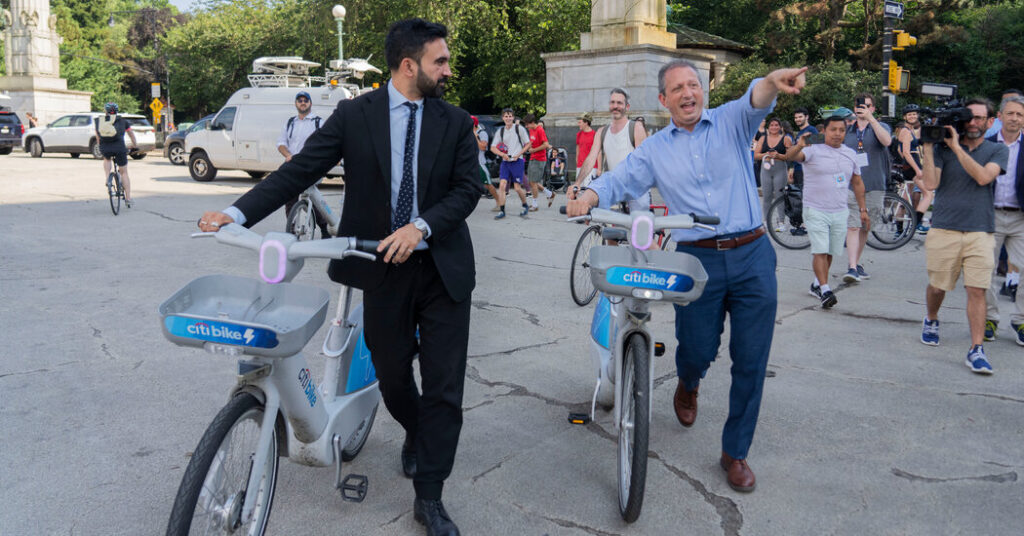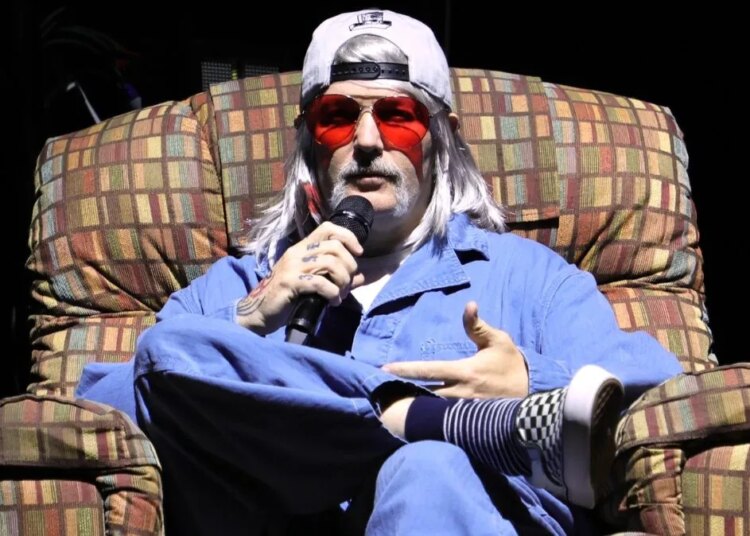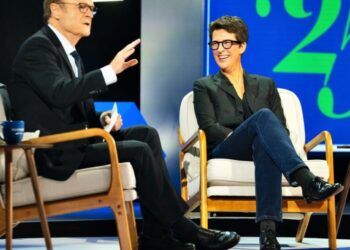Zohran Mamdani was in the final, chaotic sprint to Election Day in the New York City mayor’s race, when he stepped off the campaign trail for an important meeting.
Sitting with him was Brad Lander, the city comptroller who had become one of his closest allies. Their “progressive bromance” during the Democratic primary in June had helped cinch Mr. Mamdani’s victory and left Mr. Lander gunning for City Hall, too, hopefully as his top deputy.
But when they met on a chaotic Sunday in late October, amid church services and canvass launches, Mr. Mamdani, a state assemblyman, wanted to talk about a different idea that Mr. Lander had floated. He told the comptroller that he would like to continue their partnership — by supporting him in a primary challenge against Representative Daniel Goldman, a vulnerable and more moderate Democrat, according to three people familiar with the exchange.
As for the high-level administration post Mr. Lander, 56, had also coveted, Mr. Mamdani told him that he planned to go in a different direction.
The sharp change-up has captivated New York’s political chattering class since it spilled into public in recent days, setting the stage for a potentially explosive House primary in the heart of New York City.
Mr. Mamdani’s quiet maneuvering — much of which has not been previously reported — has also offered an early window into the unsentimental calculations guiding the incoming mayor as he builds his administration and flexes his political muscle.
Asked to comment for this story, Mr. Mamdani’s spokeswoman, Dora Pekec, said simply that Mr. Lander “continues to be a trusted ally and partner to the mayor-elect.” But other supporters who have spoken to him added that Mr. Mamdani, a sharp critic of Israel, was eager to unseat Mr. Goldman, whose views on the war in Gaza are well to his right.
People who have spoken with Mr. Lander recently said he had played down the sting of being passed over for a top city post.
“Brad’s moral clarity, his willingness to use his voice to defend our democracy and put his body on the line to protect our neighbors are all vitally important and unfortunately all too rare,” said his top adviser, Alison Hirsh. She said he would bring these qualities to Washington “if he chooses to run.”
The relationship between Mr. Lander and Mr. Mamdani has been the subject of unusual interest since the two men rolled out a novel cross-endorsement in June as competing candidates for mayor. Politicians often talk about forming alliances to defeat a common enemy, in this case former Gov. Andrew M. Cuomo, but rarely follow through.
Mr. Lander, a well-known progressive with 15 years in public office, vouched for Mr. Mamdani, a 34-year-old Muslim and democratic socialist, with fellow Jewish Democrats. And after federal agents arrested Mr. Lander as he escorted migrants in an immigration courthouse, he used some of the attention to boost his formal rival.
On the night of his primary victory, Mr. Mamdani put his arm around Mr. Lander and said they had modeled “the politics of the future, one of partnership and of sincerity.”
Many progressive New Yorkers supporting Mr. Mamdani — but uncertain about his youth with just five years in the State Assembly under his belt — felt comforted by the prospect of Mr. Lander joining City Hall as a partner overseeing the city’s day-to-day operations.
Mr. Lander clearly liked the idea, too. At least four fellow elected officials who spoke directly with him in the weeks after the primary told The New York Times that they had come away with the impression that he badly wanted the job and was under serious consideration.
But interviews with more than a dozen advisers and allies of both men suggest that the relationship was always more complicated than it looked publicly. It was, they said, a shotgun political marriage of shared values that strained from constant public speculation and competing priorities.
Mr. Mamdani and Mr. Lander discussed the vague possibility of working together in government when they first met before the primary to iron out their cross-endorsement over Lebanese food. Despite rampant speculation, no position was ever promised, according to the people familiar with their interactions, who were not authorized to discuss them publicly.
In July, when questions about Mr. Lander’s position in a potential administration reached a fever pitch, Mr. Mamdani grew frustrated and asked Mr. Lander to tamp it down in a conversation Gothamist first reported. In public, Mr. Mamdani repeatedly said that no personnel decisions had been made.
Mr. Mamdani eventually did consider Mr. Lander for first deputy mayor, alongside other candidates who included Daniel Garodnick, the head of the Department of City Planning, and Anthony Shorris and Dean Fuleihan, two former first deputy mayors.
The mayor-elect told associates that he needed a seasoned bureaucrat who had overseen a city budget, weathered a mayoral crisis and moved legislation through Albany. Mr. Mamdani concluded that Mr. Lander, a longtime politician whose earlier job was running a small nonprofit that focuses on affordable housing, was simply not it.
On Monday, Mr. Mamdani announced that Mr. Fuleihan, a veteran of city and state government, would reprise the role he had once held under Mayor Bill de Blasio.
Allies and advisers of Mr. Lander said he never assumed he had a job in City Hall locked down and began laying the groundwork in the spring before the primary for a potential run against Mr. Goldman. The congressman’s district, New York’s 10th, connects Brooklyn and Manhattan, and voted overwhelmingly for Mr. Mamdani. Mr. Goldman remained neutral in the mayor’s race.
Those conversations have since accelerated, including at an annual post-election gathering of New York’s political class in Puerto Rico. Mr. Lander and Mr. Goldman both used the event to line up support, at one point dining feet from one another at Morton’s steakhouse.
Mr. Lander has told other Democrats that he believes Mr. Goldman, a former federal prosecutor and Levi Strauss heir, is not meeting the political moment. Mr. Goldman, 49, won the seat in 2022 by beating several more progressive candidates who split the vote.
Mr. Goldman has drawn praise for sharply questioning Trump administration officials in congressional hearings, but his more moderate positions on Israel and the war in Gaza have angered left-leaning constituents. Mr. Lander, who has been a much firmer critic of Israel’s handling of the war, has told allies he wants to take an activist posture toward the Trump administration.
Now, Mr. Goldman is preparing for a fight.
Simone Kanter, a spokesman, said Democrats should be focused on fighting Mr. Trump not “wasting time and money fighting other Democrats.”
“Congress is not a consolation prize, but if Brad feels compelled to make this about himself, then Dan will eagerly stand on his record of standing up to Trump, leading the opposition to ICE and fighting for his constituents,” he said, referring to the Immigration and Customs Enforcement agency.
Hungry to oust Mr. Goldman, top officials from the local chapter of the Democratic Socialists of America, an integral organizing cog in the success of Mr. Mamdani’s grass-roots campaign, promised Mr. Lander over the summer that they would not endorse another candidate, according to four people with direct knowledge of the matter.
But as Mr. Lander was awaiting word on whether he would land a position in City Hall, Councilwoman Alexa Avilés, a D.S.A. member, began plotting her own run.
Ms. Avilés’s criticisms of Israel and her close ties to Mr. Mamdani’s coalition would contrast sharply with Mr. Goldman’s positions. Because of the uncertainty over whether Mr. Lander would be running against Mr. Goldman, the D.S.A.’s local chapter recently voted behind closed doors to endorse her.
That endorsement is now in limbo, however, as leaders of various groups on the left attempt to head off a showdown that could fracture their coalition.
“The most important thing here is defeating Dan Goldman who doesn’t match the values of his constituents or the district,” said Jasmine Gripper, a co-director of the left-leaning Working Families Party. “We need to unite the field and have one candidate.”
The standoff between Mr. Lander and Ms. Avilés presents another test for Mr. Mamdani as he tries to expand the left’s political power and gain the trust of New York’s business class and political establishment, which hold more moderate views.
Mr. Mamdani has privately told Ms. Avilés that he would support and campaign for Mr. Lander if he ran, according to three people familiar with the matter. The mayor-elect has not spoken about the race publicly; Ms. Avilés did not respond to questions about her private conversations.
The dynamic echoes another brewing drama in a neighboring district, where Mr. Mamdani has privately tried to discourage Councilman Chi Ossé, an ally, from running against Representative Hakeem Jeffries, the top House Democrat.
So far, neither Mr. Ossé nor Ms. Avilés has backed down.
Since her desire to challenge Mr. Goldman emerged last month, Ms. Avilés said she had “received an outpouring of support from district residents” thirsting for a change in leadership and would make a final decision once the uncertainty over the D.S.A.’s endorsement was resolved.
Nicholas Fandos is a Times reporter covering New York politics and government.
The post The Strategic Uncoupling of Zohran Mamdani and Brad Lander appeared first on New York Times.




